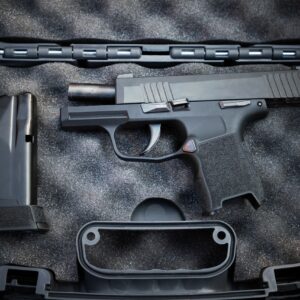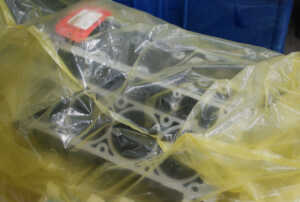Ideal Firearm Storage for Rust Prevention

Ideal Firearm Storage for Rust Prevention
You prioritize safe firearm storage to protect yourself and the people around you. What what if your gun safe isn’t protecting your firearm? Specifically, we’re referring to the fact that some popular firearm storage solutions fail to minimize the risk of gun rust.
Rust and corrosion of firearms are most commonly caused by exposure to high humidity, water, oxygen and dissimilar metals. One would think a gun safe would minimize such exposure, but it really depends on the materials of which the safe is composed and how it’s constructed. Unless the firearm storage unit is airtight, the potential for corrosion is something you can’t afford to overlook if you want your gun to last.
Rust and other forms of corrosion can cause discoloration, pitting, and even impact functionality on a firearm – which is the last thing you want when you’re dealing with such a powerful instrument.
Senior curators with the NRA National Firearms Museum say ideally guns should be stored at an ambient temperature of about 70 degrees with no more than 50 to 55 percent relative humidity. For antique guns and other collectibles, the museum has dedicated air handler controls in gun storage vaults that keep the temperature and humidity at constant ideal levels at all times. Curators even go so far as to test these levels multiple time each day.
Most gun owners don’t have the time, resources, or desire to dedicate that level of care to storing their firearms. The good news is they don’t need to. There are effective firearm storage strategies that can go a long way toward minimizing the risk of corrosive damage that don’t cost a fortune or consume tons of time.
The following are a combination of tips from both the NRA and Zerust on optimal conditions for firearm storage.
Be picky about which firearm safe you use.
A primary goal of any firearm storage solution is to keep it out of the hands of people who shouldn’t have it. But that’s not the only goal. You want to keep your gun away from both the wrong people and the wrong environmental conditions. It is true that most modern guns are manufactured with rust-resistant coatings, but they aren’t corrosion proof.
In fact, some safes contain padding that can actually lock moisture in – which can be catastrophic if not detected right away. Also, some cases are made with adhesives that can dissolve over time, triggering a corrosive chemical reaction that can adversely impact the metal components of your firearm.
Look for a safe that not only offers adequate access security but also some degree of protection from dust, water, and open air.
Position your gun safe on an interior wall.
You may not have a room or safe with tight temperature and humidity controls, but you can minimize temperature fluctuations (which can lead to the buildup of damaging condensation) and the influence of outside temperatures by placing the safe on an interior wall. The contents of the gun safe could still be exposed to some environmental variations, but less so than if you’ve got the safe up against a wall that goes to the exterior. If you can help it, avoid storing your gun in a garage, vehicle, attic or shed, as these areas can be volatile when it comes to shifts in humidity and temperature.
Carefully clean your firearms before putting them in storage.
If you put your gun in the safe without making sure it’s free of dirt, debris, salt, hand oils, etc., these elements aren’t going to magically evaporate. Their presence can exacerbate and accelerate corrosion risks to a firearm that’s in storage. To avoid this, use a high-quality gun cleaner and gun oil after every use and before placing your gun back its storage case.
Use VCI bags, VCI capsules, and VCI tube and barrel strips.
Unless you have an airtight, humidity-and-temperature-controlled firearms storage unit, there’s always a possibility your firearm will be vulnerable to corrosion – no matter how meticulous you are with cleaning.
An easy, cost-effective way to protect your firearms without spending a fortune for a safe is with VCI products. VCI is short for “vapor corrosion inhibitor” (though sometimes you’ll also see it spelled out as “volatile corrosion inhibitor” – same thing). Basically these products are made with polymers that release a non-toxic, anti-corrosion vapor. When in an enclosed space with metals that can potentially corrode, these vapor molecules settle on the metal, creating a thin barrier that protect against exposure to moisture, oxygen and dissimilar metals. When the enclosed space is opened, the molecules dissipate harmlessly into the air.
Gun owners have several VCI choices for storage of firearms, including VCI poly bags (just put your gun in the bag before putting it in the safe), VCI vapor capsules (adhesive backings allow you to simply stick one on the interior wall of the gun safe) or tube and barrel strips (VCI polymer tubes that fit inside the barrel of your gun to protect the interior components).
If you have questions about which VCI firearm storage solution is best for your setup, our dedicated rust prevention experts can help you weigh all your options.
Contact Zerust at 1-866-2-ZERUST (937878) or via our online Contact Us form.
Additional Resources:
Top 6 Expert Tips to Prevent Gun Rust, Sept. 9, 2022, NRA
More Blog Entries:
Choosing the Best Gun Oil to Prevent Rust, Jan. 15, 2024, Firearm Storage Rust Prevention Blog




